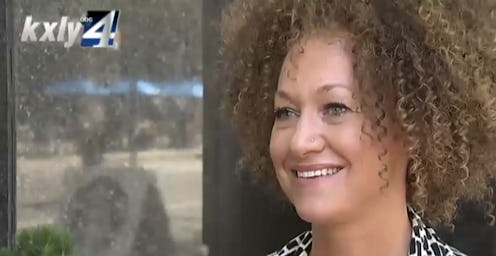News
Is Being Transracial Actually A Thing?

Former NAACP Spokane president Rachel Dolezal has officially added the word "transracial" to our everyday lexicon, insisting to Today show host Matt Lauer on Tuesday that her racial identity was fluid. "It's a little more complex than me identifying as black or answering a question of, are you black or white?" Dolezal told Lauer, adding that she has long identified as a black woman. But is there really such a thing as "transracial?"
Well, Dolezal herself hasn't been so clear on what the term means. She told Lauer that began drawing self-portraits with "the brown crayon" at five years old, and has since felt like a member of the black community despite her ethnicity.
However, for Dolezal, it's more than just a feeling — or so she says. “I don’t put on black face as a performance,” Dolezal told Lauer. She also denied explicitly changing her features, including darkening her complexion, to "pass" as an African-American or biracial woman.
Her parents, on the other hand, have claimed over the last few days that their daughter was deceiving people by trying to alter her ethnicity and race. “She’s white," her mother, Ruthanne Dolezal, told CBS News. "Rachel has wanted to be somebody she’s not. She’s chosen not to just be herself but to represent herself as an African-American woman or a biracial person."
Still, others have not so much come to Dolezal's defense, but raised the possibility that there is a "transracial" state of mind. According to NYU sociology professor Ann Morning, who specializes in mixed race studies, Dolezal may not be an outlier. "We’re getting more and more used to the idea that people’s racial affiliation and identity and sense of belonging can change, or can vary, with different circumstances," Morning told CBS2 in New York. So, essentially, Morning is saying that being "transracial" is like belonging in a race other than the one you were born.
However, "transracial" shouldn't be compared to being transgender. Psychology professor Mikhail Lyubansky, who teaches at the University of Illinois, Urbana-Champaign, recently told Yahoo! Health that the word "transracial" first came about following the rise of cross-racial adoptions — that is, people who were adopted into families of other races, and are bridging both races and cultures.
That meaning of "transracial" seems to be evolving — and it's confusing, according to Lyubansky, who told Yahoo:
With the greater visibility and growing acceptance of people who identify as transgender, the word ‘trans’ has largely evolved to refer to those whose gender identity is different than the one assigned to them at birth, which is sometimes described as feeling/believing/knowing that they are one kind of person. This description … makes sense when describing both trans men and trans women, meaning that it fits equally well regardless of direction. Applying this concept to race makes little sense to me. ‘Trans’ refers to a lack of fit between biology and identity, but there is no biology involved in race.
A post on So Let's Talk About has a similar take to Lyubansky, arguing that this new meaning of "transracial" only works in one direction.
One last strike against anyone claiming to be transracial: It only works one way. Only white people can claim to be another race on the inside and then “perform” that race because race operates with white as the default. Racial classifications are based on deviations FROM whiteness. Rachel could pay a Black woman to do her hair and then pick up some NARS bronzer and say “Look! I’m not white!” I can’t straighten my hair and put chalk on my face while saying “Look! I’m not Black!” Transracial as a concept is another extension of white privilege, with those people – firmly situated at the top of society – experiencing an overwhelming need to identify with some other culture to validate their misplaced feelings of oppression because of their affinity for said culture.
And Melissa Harris-Perry put forward perhaps the most intriguing question, acknowledging that maybe there is a way to be "cis-Black" and "trans-Black" in an MSNBC interview. But if that's the case, how do we then define this new kind of Blackness, if it exists, asked Harris-Perry?
I want to be very careful here, because I don't want to say it's the equivalent of the transgender experience. But there is a useful language in "trans" and "cis," which is just to say some of us are born cisgendered, and some of us are born transgendered. But I wonder, can it be that one will be cis-Black and trans-Black? That there is actually a different category of Blackness that is about the achievement of Blackness, despite one's parentage?
Given this evolution of "transracial," perhaps Rachel Dolezal could have culturally identified as black while also passing as a white woman. But one of the problems with Dolezal, it seems, is that she's taken the idea of "transracial" from being a cultural identity and applied it to physicality — passing as a certain race — which is a whole different issue that carries serious sociopolitical implications.Image: screen shot/Today